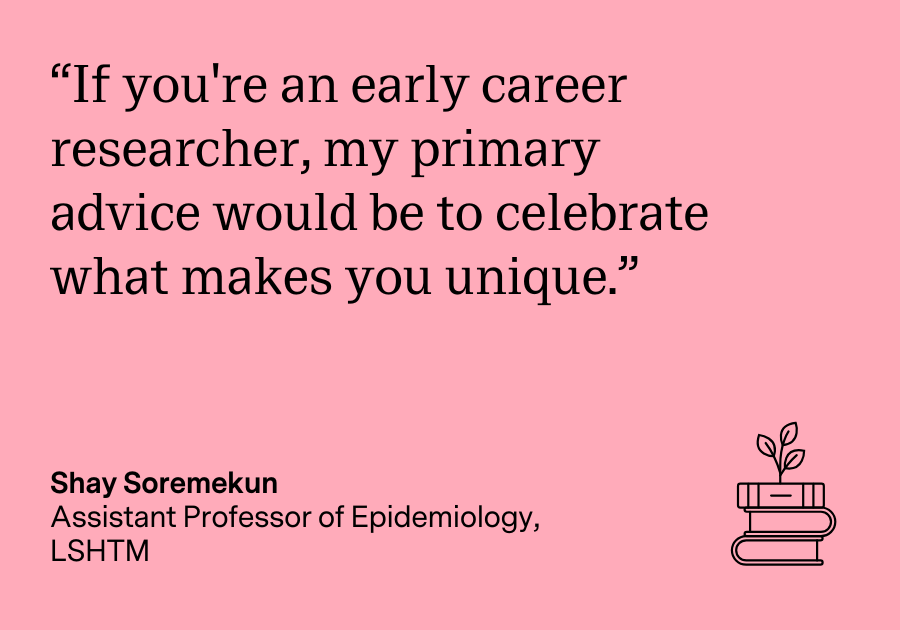
Interview with Shay Soremekun by Centre SLO Whitney Langlee.
Whitney Langlee: My first question, can you tell me about your experience as a researcher in evaluation?
Shay Soremekun: It's been a rewarding and a great learning experience, despite some ups and downs! Ultimately, I think my experiences have brought me to the position I am in now, where I feel very clear about what I want from my career going forward.
I started at the school as a Research Assistant, working on projects in Ghana that followed up a population cohort of women and children to assess the impact of different interventions on maternal and child health. I’ve since expanded this focus and work on a range of epidemiological studies from malaria to climate change. This type of work has required both detail orientation but also an ability to see the bigger picture, so I’ve learned a lot in terms of accuracy, and what’s required to produce good quality research. This has shaped the way that I view my own career.
Whitney Langlee: Are there any women who’ve inspired you as a researcher?
Shay Soremekun: The first person I have to say is my mother who was a nurse from Trinidad in the West Indies, and came to this country when I was just two years old. She worked two jobs to get us into private school, supported our music lessons etc. Everything she did was for myself and my sisters. Everything that I do in science is shaped by the type of mother I have.
I’ve encountered many admirable women at LSHTM and it would be impossible to mention them all. I however worked longest with Professor Betty Kirkwood on the Ghana trials so she must get mention; I’m forever grateful for her example of dedication to high standards and doing excellent, policy-relevant research. I’d also like to mention Professor Mitzy Gafos, co-Director of the Centre for Evaluation of which I am a deputy director – from the outset she has been incredibly encouraging of everyone’s ideas and supportive in their realisation, and with Lucy Pratt (co-Director) creates a positive and enabling environment whilst managing a large team.
Outside the LSHTM there are so many women I admire but I’d like to highlight just one: Ursula Burns, the first black CEO of Xerox, founder of the private equity firm Integrum Holdings, and President Barack Obama’s pick for his national programme on STEM. Her achievements, coming from a poor background in New York really echoes mine (especially as a child of a single parent), so she’ll always be a source of inspiration about what’s possible if you don’t let circumstances defeat you.
Question: Are there any specific challenges you have felt in relation to your positionality within the field of evaluation?
Shay Soremekun: We are in an era of some fatigue around the discourse of the feelings of others and positionality in general – and I have some sympathy with this – but I feel we do need to hear people out who have different experiences to us, who may have had to overcome different barriers to us, and acknowledge these experiences.
To your question - Is the positionality/intersectionality of being perhaps an ethnic minority from a working-class background, an immigrant, raised by a single parent etc - put me at a disadvantage in this context? In many cases yes, but it has also been the source of my drive to do well and make my family proud, and I have to say I’ve had some fantastic support from peers and senior academics along the way.
Conversely, I even think going to a private school surrounded by high achieving girls who were all white equipped me for this environment! Crucially I’ve learnt one has to find the balance between absorbing some discrimination and just getting on with it versus standing up for yourself and others. Ultimately, the goal is to do my bit improve the working environment for future researchers.
Question: Is there anything that you think within the field of evaluation that you would like to draw particular attention to?
Shay Soremekun: One initiative I'm very much involved with is a project to develop guiding principles for researchers who are interested in approaches for more equitable and decolonial evaluations. We’re doing this partially by considering alternative ways of thinking about evaluations, incorporating methodologies from Africa and other indigenous populations around the globe, but also considering equity along the spectrum from participant selection to survey design and analysis.
Whitney Langlee: Looking forward, is there any advice that you would give to a new or early career researcher in the field?
Shay Soremekun: If you're an early career researcher, my primary advice would be to celebrate what makes you unique, and not to focus too much on trying to be something that you aren’t. Consider what skills and talents you have to enhance what you do as an evaluator – this could even be for instance using your creativity for out-of-the-box thinking. It may take a bit more work, but particularly if you are a minority group it would also be to your benefit to be intentional in your efforts to find your tribe within your working environment.
I would also encourage early career researchers to be much more proactive about expectations for their scientific career and be open about your interests with supervisors and mentors. This becomes even more important as you progress to mid-career stage, and something I wish I did more of when I was an early career researcher.
If you enjoyed this article and would like to build a career in global health, we offer a range of MSc programmes covering health and data, infectious and tropical diseases, population health, and public health and policy.
Available on campus or online, including flexible study that works around your work and home life, be part of a global community at the UK's no.1 public health university.
